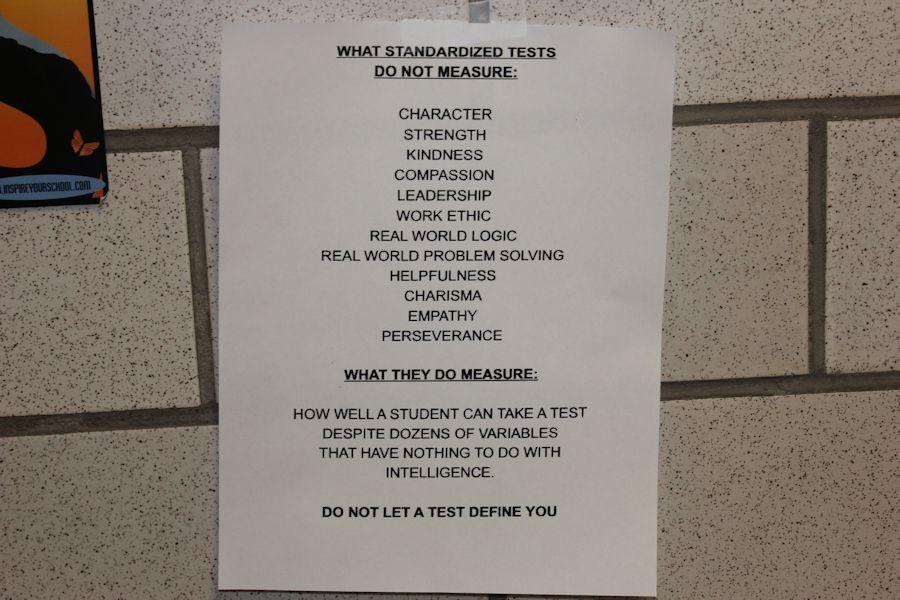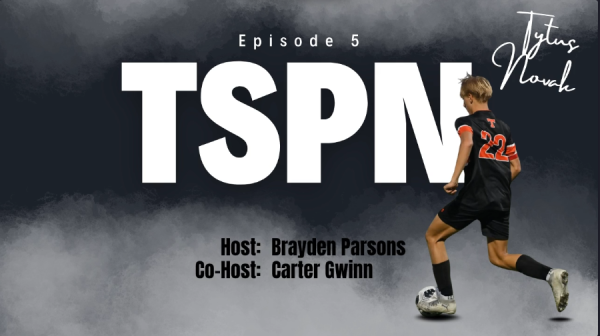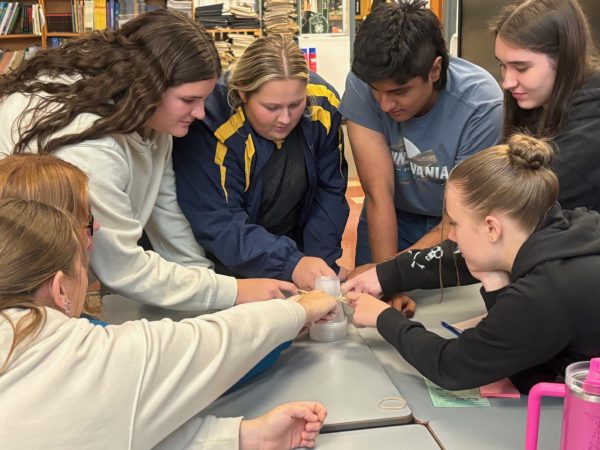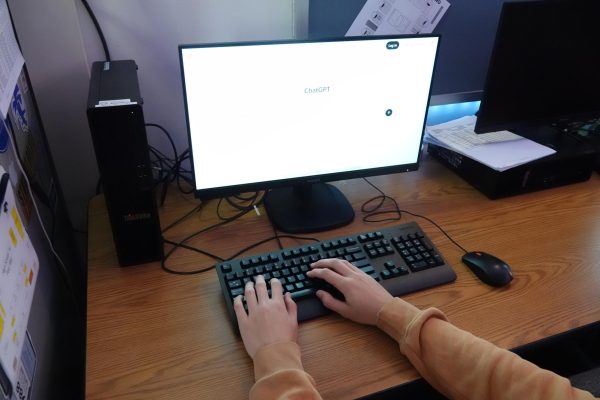“Do Not Let a Test Define You” – TAHS students and teachers speak out on standardized testing
As schools across the state wrap up the Keystone testing season, students and teachers alike can finally relax and begin to get out of standardized testing “intensity mode.”
But through the chaos of getting students into their correct testing rooms, getting the right bar-coded stickers on test booklets, and getting all the #2 pencils freshly sharpened, a group of students decided to take a stand to reform standardized testing.
On Tuesday, May 12th, the day before Biology Keystone Exams were administered, “protest” posters appeared on the walls of the high school.
In bold, underlined print the posters are titled “What Standardized Tests Do Not Measure.” They then list common traits that standardized tests don’t measure, such as compassion and kindness.
The posters also state what standardized tests do measure: “How well a student can take a test despite dozens of variables that have nothing to do with intelligence.”
At the bottom of the poster, stated in bold, underlined print, was the phrase:
“DO NOT LET A TEST DEFINE YOU.”
The posters were noticed throughout the school by both students and teachers. What the creators deemed as a “social experiment” attracted even more attention that night when many Tyrone students were followed on Twitter by the account @ReformTesting.
The account tweeted pictures of the posters hung around the school, and also some tweets telling students to not stress about the test. The account also interacted with some students, who expressed their support or even resentment to the point the account was trying to make.
One of the co-creators of the poster and account anonymously said, “The poster and the account are not meant to make a massive change all at once. They were created to plant a seed in students’ heads that maybe this isn’t the best way to turn our education system. Just to spark an idea and some more things than students are used to doing.”
A combination of the Keystone season and this “movement” has sparked conversation in the student body.
It is clear that no students like the tests, but there are students in the community that truly resent these exams, for how they’re affecting students, teachers, and our education system.
Many students uninvolved with the social experiment spoke out to the Eagle Eye about how they feel about standardized testing.
It is a wide misconception that the kids that hate the tests the most are the ones that are failing them. There are students that are passing standardized tests with flying colors, yet still see the flaws in their administration.
Sophomore Kendall Gardner feels as if standardized testing is not a beneficial way to assess students true learning.
“It makes students feel inferior if they don’t score advanced,” says Gardner, “It’s like they’re testing various types of animals on their ability to climb trees and there’s a minority of monkeys in the mix.”
Gardner believes that these tests don’t measure the student’s aptitude in subjects, but instead how well they can take a test.
“A teacher whom I respect very much has repeated many times ‘It’s all about strategy’”, said Gardner, “and he’s right. Sure, you have to know what synonyms and metaphors are but at the end of the day, you don’t have to understand what you’re reading to answer the questions. The reason that Tyrone’s English Keystones passing rates are so high is because Mr. Rutter knows that he’s teaching us how to take a test.”
Junior Adam Zook also had a strong opinion about standardized tests.
“Standardized tests go against what education is supposed to be,” says Zook. “They measure how much of a robot you are. How well you follow orders and don’t ask questions. You do well on these tests either because you are naturally intelligent or because you were forced to study to meet to standards of somebody else. If that’s not wrong, then I refuse to accept what is considered right.”
It is clear that students have a strong opinion about these tests, but it turns out that teachers also have something to say.
Mr. David Rutter and Mrs. Mandy Lumadue, 10th grade English and Biology teachers, play a large role in teaching for the Keystones, being the only teachers that teach for their particular subject.
Both Rutter and Lumadue, who teach for the Literature and Biology Keystones, base the majority of their yearly curriculum on the “Keystone Anchor” posters hanging in their classrooms.
Both teachers agree that they understand that the state needs some way to measure a school’s academic success, but this is too much.
“I believe there needs to be some accountability for all teachers, but having one test measure students’ learning and how effective a teacher is seems unfair to all involved,” said Lumadue.
Rutter believes that the issue is that students are being tested too young.
“I have always believed that standardized tests have no business in the younger elementary grades–too much pressure on such fragile, young minds!” said Rutter, “Kids that are in 3rd grade should be enjoying reading, math, and science with lessons and activities that engage and foster the love for the subjects.”
It is clear that teachers play the a key role in the results of the Keystones, being the ones that actually teach the information. Although students are feeling the stress of the tests, teachers admit to sharing some of that stress and pressure.
“To say I don’t feel pressure would be an outright lie,” commented Rutter, “I usually don’t sleep the few weeks leading up to the exam because I am worried about the exam and how it will impact the students.”
Lumadue also feels the pressure of teaching for the tests. “As the only Biology teacher of all 140 of my students tested, it puts a lot of pressure on my shoulders every year to make sure my students are learning what is on the test.”
Another negative effect of the standardized testing that teachers express is that, according to many teachers, it restricts their curriculum. Instead of teaching what students are interested in, or things that they want to teach, teachers find themselves required to follow the strict guidelines of the tests.
“I do feel that my content is restricted based on only having so much time to get all my curriculum taught,” said Lumadue, “I have had to cut out so many fun labs that support the students’ learning. Yes, there is a little jealous for teachers who can teach what kids want to learn and dig deeper into topics that students are interested in, which I can’t because of the time constraint of having to finish my curriculum by the end of April to review for the Keystones.”
Rutter feels the same way about his English 10 course, and he admits that since the introduction of these new tests, his curriculum has changed.
“I have felt my own creativity being tested and many of the ideas or items I have done in the past would not work within the confines of the content needed to be covered in the exam,” Rutter says, “I used to do Lord of the Flies with my classrooms every year. Now, I feel like that can’t be done because in the back of my mind I keep thinking, well that won’t be on the test.”
Rutter also revealed his strategy to his students’ success on the Keystone exams over past years.
“Let’s be honest, you have to know the tricks to take the test,” says Rutter, “I have always hoped that my students walk away from my class with a stronger set of skills in reading and writing. But to do well on the test, you have to teach the test. There’s no way around it.”
It is clear that both students and teachers have a strong opinion on standardized testing; the majority seeming to have a negative one. However, not all students have this opinion.
Sophomore Jack Murtagh expresses his neutral feelings toward standardized testing, believing that there’s really nothing wrong with them.
“It’s the only feasible way to measure a mass of students,” says Murtagh, “I would say that they measure a student’s general knowledge of a subject with some practical application incorporated as well.”
Whether the tests are affecting us positively or negatively, it is no question that they are affecting us all. These tests have definitely caused an impact to our education system, and whether we like them or not, they’re here, and they’re here to stay.
With that being said, next time you’re studying for, in the process of taking, or awaiting your score of a standardized test, ask yourself, what do you think the tests measure?

Hi there, my name is Haley Butina! I’m a sophomore at Tyrone Area High School. Although I don’t do any sports, I am very involved in many other extracurricular...

Hello, my name is Zane Hertzler. This year will be my first year as a staff writer for the Eagle Eye. I plain to get the news out as soon as I can. I'm...














Steve Everhart • Jun 3, 2015 at 1:12 pm
Character, Strength, Work Ethic, and Perseverance…please remove these 4 traits from your list of what the tests do not measure. These are measured on the Keystone exams–on every single question.
They’re not bubbled with an ABC or D–but many Tyrone High students outperform the state precisely because they demonstrate these characteristics year round in class. I’ve seen what passes for perseverance and work ethic at other schools. It’s not pretty, and it comes out in the wash when parents, students, and teachers collectively opt out of the imperfect standards of accountability that only an imperfect world can offer.
Define yourself by a test? Define yourself by the perseverance you demonstrate when you’re thrown a buzz-kill like a bubble-sheet. Life’s full of buzz-kills and distortions. If you’re smart, you’ll know these when you see them. Don’t let them distract you from the real game–and play it like you mean to win it.